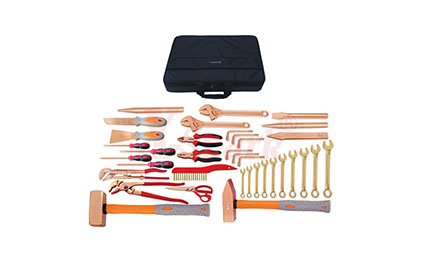Precautions For The Use Of Explosion-Proof Hand Tools
1. For impact tool products, in daily work, the surface accessories of the tool should be treated 20 consecutive times, and then cleaned before use. Do not use it continuously to avoid the tool from contacting, friction and heating for a long time.
2. Wrench products should not be overused. It is not advisable to use a casing to extend the moment arm or bind other metal rods and use a hammer to knock (except for the knocking of a wrench) to turn the fasteners.
3. After use, clean the surface dirt and deposits and store them in a dry and safe place.
4. The cutting tool should be placed in the sink, and lightly touch the grinding wheel to sharpen it. Do not use too much force and do not touch the grinding wheel for too long.
Explosion-proof mechanism of explosion-proof tools

Ordinary tool materials are usually made of steel materials. During use, sparks are generated due to friction and collision. The main reason is that steel materials contain more carbon (in order to increase their strength and hardness). The heat cannot be absorbed and conducted in time. When the heat is concentrated on the tiny metal particles generated during use, sparks will be generated. Therefore, these tools cannot be used in places where there is a risk of explosion.
Tools used in explosive hazardous locations must be made of special materials that do not produce friction sparks, collision sparks, or even high-temperature surfaces. Such tools are called explosion-proof tools. The main material of explosion-proof tools is copper. Copper contains almost no carbon and has good thermal conductivity. Due to its soft material, when friction or impact occurs, the contact point will undergo plastic deformation to avoid excessive energy concentration and rapid heating. Disperse and reduce the risk of extreme heat. However, the strength and hardness of pure copper are too low to be used directly as a tool. In order to improve the strength and hardness of copper alloys, it is necessary to add appropriate metal elements, such as aluminum, titanium, beryllium, and nickel.
We are explosion-proof hand tools suppliers. Please feel free to contact us if you are interested in our products.
Previous: Use Of Diagonal Cutting Pliers